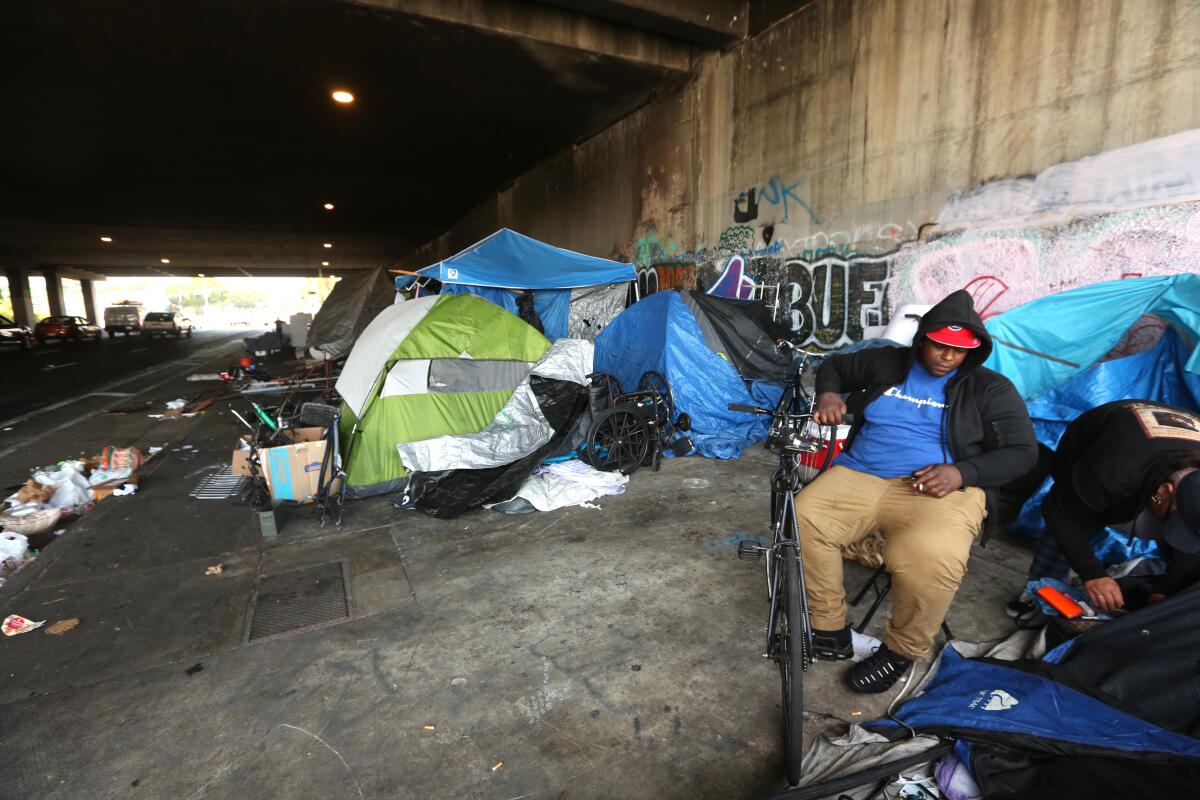Column: Jailing unhoused people for sleeping in public is no solution to homelessness

- Share via
This week a group of conservative judges on the U.S. Court of Appeals for the 9th Circuit spoke out against allowing homeless people to sleep in public spaces, after the court’s liberal majority decided that those with nowhere else to rest cannot be subject to criminal penalties.
It’s the latest ideological battle in a court where President Trump was able to replace four left-leaning judges. Back in 2018, a 9th Circuit panel ruled 2 to 1 that government was barred from imprisoning people for not having a place to live by the 8th Amendment’s prohibition against cruel and unusual punishment. That decision was upheld in 2022 following legal challenges to ordinances targeting encampments in Oregon.
However, with the 9th Circuit now more evenly split, the next test case or the next election could upend how the 8th Amendment is applied and thus change the entire conversation about homelessness — very much for the worse. Instead of pursuing affordable housing and outreach services, local governments will be under pressure to move unhoused people out of sight, even if that means behind bars.
Opinion Columnist
LZ Granderson
LZ Granderson writes about culture, politics, sports and navigating life in America.
We already have an entire economy built around incarcerating people who, in most cases, had homes to go to. What’s to prevent our criminal justice system from monetizing the exploitation of those who don’t?
The 2018 ruling from the 9th Circuit drew a clear line to prevent that, saying a city law “violates the 8th Amendment insofar as it imposes criminal sanctions against homeless individuals for sleeping outdoors on public property, when no alternative shelter is available to them.” The conservative judges in their dissent, however, focus on the effect of having no criminal sanctions, saying the result of the current limitation is “a personal federal constitutional ‘right’ for individuals to camp or to sleep on sidewalks and in parks, playgrounds, and other public places in defiance of traditional health, safety, and welfare laws.”
The sight of encampments or a homeless person having a mental health episode can be frightening. But the 8th Amendment was established so that the government would not forget the humanity of the people over whom it has power — and in this case, homeless individuals are among the most vulnerable and most marginalized in this society. Surely the law must protect individuals whose only “crime” is having no place to sleep.
In his criticism of his progressive colleagues, the 9th Circuit’s Judge Diarmuid O’Scannlain said they were “paralyzing local communities from addressing the pressing issue of homelessness.”
But punishing people for sleeping in parks does not address homelessness.
At best, it’s a dehumanizing shell game. A game where those of us with homes don’t have to be reminded of the conditions of those less fortunate as we make our way to church or school. A game where 20% of America’s office buildings are sitting empty, and yet somehow the best response to homelessness that many leaders can come up with is “ban sleeping on park benches.” A game where in New York a penthouse is selling for $250 million while 100,000 people are in shelters and the city has experienced an 18% jump in homelessness from the year before.
It’s not only a liberal-state issue, mind you. Florida, Texas, Utah — reliably red states — are also seeing increases in people without housing. From drug addiction to crushing medical bills leaving people destitute, the nation is facing an epidemic of homelessness, and the solution cannot simply be jail. We already have the highest incarceration rate in the world. Arresting people who have no options left is just adding another tier of disenfranchisement.
I agree with part of the critique from conservative Judge Milan Smith Jr., who wrote that there are stretches of Los Angeles “where one cannot help but think the government has shirked its most basic responsibilities under the social contract: providing public safety and ensuring that public spaces remain open to all.” I have lived in very different parts of the city, including downtown — and I can tell you he’s not lying. Action is needed, but it matters which actions we take. If we start arresting people for essentially being too poor, that social contract might as well be toilet paper.
More to Read
A cure for the common opinion
Get thought-provoking perspectives with our weekly newsletter.
You may occasionally receive promotional content from the Los Angeles Times.












